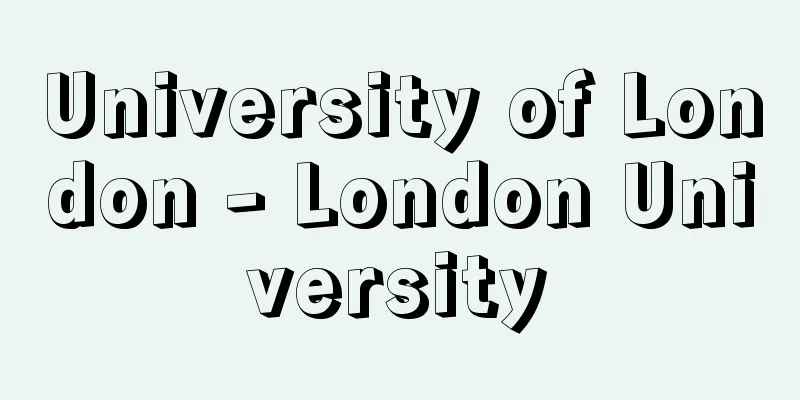University of London - London University

|
The first modern university in the UK. It was founded in the capital as the third university to rival Oxford and Cambridge. First, University College was established as a joint stock company by a group of radicals, utilitarians, and nonconformists, including the poet T. Campbell (1826), followed by King's College, founded by Anglican people (1829) in opposition to this "godless university" that had no religious overtones. Both colleges adopted a commuter system to keep education costs down and offered a wide range of curriculum, including modern science and medicine, to the children of the newly emerging middle class, but did not have the right to award degrees. Then, in 1836, a royal charter was issued to establish an institution called the University of London to conduct examinations and award degrees to certain students, including those of the two colleges. The university's function as an examination institution eventually expanded to the colonies, giving rise to a unique system of external degrees. In 1878, it also became the first in the UK to award degrees to women. The University of London was established as a research and educational institution in 1900, and since then it has absorbed and integrated many research and educational facilities such as the Imperial College of Science and Technology (1907), the London School of Economics and Political Science (LSE, 1895), and hospitals, becoming the country's largest allied university to this day. As of 2000, there are 52 colleges and institutes. As of 1997, there are approximately 101,600 students and 7,400 teachers. [Yoshihito Yasuhara] [References] |Source: Shogakukan Encyclopedia Nipponica About Encyclopedia Nipponica Information | Legend |
|
イギリス最初の近代的大学。オックスフォード、ケンブリッジ両大学に対抗する第三の大学として首都に誕生。最初にユニバーシティ・カレッジが詩人T・キャンベルなどの急進主義者や功利主義者、非国教徒のグループにより株式会社組織で設立され(1826)、続いてこの宗教色を排した「無神の大学」に対抗してキングズ・カレッジが国教派の人々によって設立された(1829)。いずれのカレッジも通学制を採用して教育費を抑え、新興中流市民階級の子弟を対象に近代科学や医学を含む広範なカリキュラムを提供したが、学位授与権はもたなかった。ついで1836年、勅許状により、両カレッジの学生をはじめ一定の学生に対して試験を実施し学位を授与する機関が、ロンドン大学という名称のもとに設立された。この試験機関としての大学の機能はやがて植民地にまで拡大されてユニークな学外学位制度を生んだ。また1878年にはイギリスで初めて女子に学位を授与した。研究・教育機関としてのロンドン大学が新たに発足したのは1900年のことで、以来、帝国理工カレッジImperial College of Science and Technology(1907)や経済学・政治学スクール(London School of Economics and Political Science=LSE 1895)、そして病院など多数の研究教育施設を傘下に吸収・統合して、同国最大の連合制大学となり現在に至る。2000年現在のカレッジおよびインスティテュート(研究所)は52を数える。1997年現在、学生数約10万1600人、教師数約7400人。 [安原義仁] [参照項目] |出典 小学館 日本大百科全書(ニッポニカ)日本大百科全書(ニッポニカ)について 情報 | 凡例 |
<<: London Correspondence Society - London Correspondence Society
>>: Great Fire of London - London Fire
Recommend
Fujiwara no Tametoki
Dates of birth and death unknown. A man of letter...
Ice cream mix - Ice cream mix
...Also, those that do not contain milk solids ar...
magistrein physica (English spelling) magistreinphysica
The Arabic medicine is a complex of ancient texts...
Kakko - Bracket
(1) Chinese and Japanese membranophonic instrument...
Emperor Ankan
The 27th Emperor. The eldest son of Emperor Keita...
Average wage - Heikinchingin
〘noun〙① The wage that is used as the basis for the...
Emire's Bell - Emire no Kane
…The flying celestial beings are particularly ele...
tsigane
…In English, they are called gypsies, which is a ...
Fraunhofer lines - Fraunhofer lines
Dark lines (absorption lines) seen in the solar s...
Ofunasama - Ofunasama
...The spirit of the ship may also be replaced wh...
Electron coins
…It is believed that coins existed in western Asi...
Dominicus (Latin)
Founder of the Dominican Order. Born in Spain dur...
Choreography
...A person who does this professionally is calle...
Andera
…A temple where nuns reside. Originally called a ...
Vasubandhu - Seshin
A great scholar of mid-period Buddhism from aroun...









